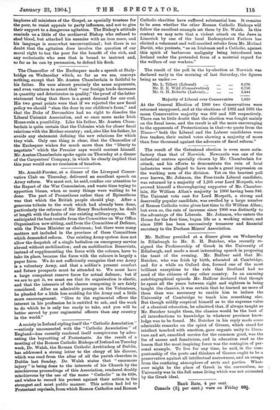Mr. Balfour presided at a dinner given on Wednesday in
Edinburgh to Mr. S. H. Butcher, who recently re- signed the Professorship of Greek in the University of Edinburgh, and made a most interesting speech in proposing the toast of the evening. Mr. Balfour said that Mr. Butcher, who was Irish by birth, educated at Cambridge, and for a while an Oxford don, formed one of the most brilliant exceptions to the rule that Scotland had no need of the citizens of any other country. In an amusing autobiographical episode Mr. Balfour declared that though he spent all the years between eight and eighteen in being taught the classics, it was certain that he learned no more of them than was necessary to enable him to induce the University of Cambridge to teach him something else. But though mildly sceptical himself as to the supreme value of a classical education, he admitted that, if always taught as Mr. Butcher taught them, the classics would be the best of all introductions to knowledge in whatever province know- ledge was to be found. Mr. Butcher in his reply made some admirable remarks on the spirit of Greece, which stood for intellect touched with emotion, gave organic unity to litera- ture and art, ennobled service for the common good, was the foe of excess and fanaticism, and in education read us the lesson that the most inspiring force was the contagion of per- sonal example. To live for any time, he said, in the com- panionship of the poets and thinkers of Greece ought to be a preservative against all intellectual narrowness, and an escape from the confining atmosphere of sects and parties. What- ever might be the place of Greek in the curriculum, no University was in the full sense living which was not animated by the Greek ideal.
Bank Rate, 4 per cent. Consols (2f per cent.) were on Friday 88f.










































 Previous page
Previous page